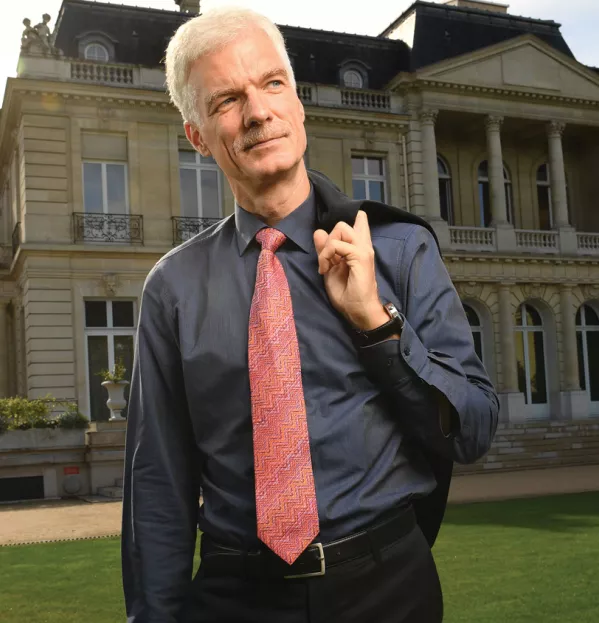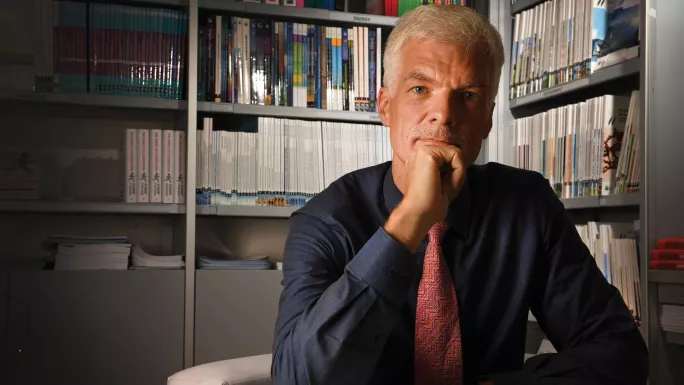I’ll know our job is done when Pisa is superfluous, says ‘world’s schoolmaster’

In an anonymous glass-fronted office in a Parisian suburb, the finishing touches are being made to a report that will influence the lives of millions of teachers and pupils.
The Programme for International Student Assessment (Pisa), which ranks the world’s education systems in science, reading and maths, will be published on Tuesday. A low score has been known to result in a type of national trauma that has become widely known as “Pisa shock”.
It is something that Andreas Schleicher, the director for education and skills at the Organisation for Economic Cooperation and Development (OECD), and the man behind Pisa, takes seriously.
“If [Pisa] is just a destructive kind of tool, then I have failed,” he says. “It is very important to me that it becomes a tool for movement and constructive development. I think the difficult issues are with the countries where there are difficult messages to convey. I want to make sure they are prepared.”
Three years ago, Shanghai topped the Pisa league table in maths, with the UK coming 26th out of 65 countries.
Michael Gove, then education secretary, claimed that the UK’s performance on the global education stage was “at best, stagnant”, justifying a swathe of reforms including the introduction of the English Baccalaureate, free schools and School Direct. Schleicher said then, in 2013, that the Pisa results had come too early in Gove’s reign to be seen as a judgement on his reforms, arguing that this would have to wait until after the 2015 results were released. That time is now.
The results are being finalised as we speak over lunch in a small restaurant in south-west Paris. Schleicher, who is tall, slim and white-haired, is wearing a big blue chunky knitted jumper with overlarge buttons at the neck. Beneath this casual look, he also sports a formal shirt and tie.
He joined the OECD from the IEA (International Association for the Evaluation of Educational Achievement), where, from a base in the Netherlands, he had worked on the Trends in International Mathematics and Science Study (Timss).
The power of Pisa
Schleicher’s first job at the OECD was to work on Education at a Glance, an annual summary of individual countries’ education statistics. But he had this idea, which his colleagues thought was “completely crazy”, to ask member countries to measure their education systems by students’ results, rather than how much money was spent. He pitched the idea to the organisation’s then director of education, Tom Alexander, who asked him to present it to senior officials.
He remembers that first presentation well: “At the time, we had 28 countries in the OECD and only five countries supported it. The rest said it couldn’t be done, shouldn’t be done or the OECD shouldn’t do it. It was really very hostile.”
After the meeting, Schleicher thought he should probably start working on a different project, but Alexander merely brushed off the overwhelming rejection and asked him to run a pilot. When the full test was launched in 2000, all 28 countries signed up.
Among the countries that had initially rejected the idea was Germany: a verdict that Schleicher had fully expected.
He was brought up in Hamburg. His mother was a doctor and his father was a professor of education, who agreed with the consensus view in Germany that education was an art, not a science, and therefore not quantifiable.
‘If Pisa is just destructive, then I have failed. It must be a tool for development.’
When Schleicher was 10, his parents were advised that he was not academic enough to attend a Gymnasium, the German equivalent of a grammar school, but they sent him anyway. Two years later, he left for a Steiner Waldorf school.
His education was intriguingly rounded, ranging from knitting to playing the violin in the Schleswig-Holstein state orchestra to winning a national prize in science. He earned a place to study physics at the University of Hamburg. But before he started, he was called to do national service and refused - in defiance of his parents’ wishes.
Instead, Schleicher followed the alternative path of social service, which took almost twice as long. In his case, it involved working in a school for disadvantaged children.
He remembers, in particular, the home visits: one teenage boy, who had been aggressive at school, had torn all the wallpaper from his bedroom walls. He had done this because his parents had gone away for the weekend and left him there alone.
“The idea that disadvantage is something that is created by society - that it isn’t inborn - I really understood by many of the personal histories of children at this school,” he says.

Handling the hostility
Pisa is popular today - 72 countries took part in the 2015 tests and more than 80 have signed up for Pisa 2018. But there is still hostility towards what is seen as its monopoly of the debate on system reform.
For Schleicher, once dubbed “the world’s schoolmaster”, it is a social responsibility to highlight lessons from the data: “Policies that are being developed and implemented are basically ideas that are tried out on millions of children, and I just thought we could do better, you know? Any evidence would be better than no evidence.”
He has accepted some of the criticisms of the methodology and focus of Pisa. For example, the study is moving away from its controversial use of the Rasch model for estimating the scores of students where questions have not been answered. And this year, it will report on students’ abilities to solve problems as a team as well as the three core subjects.
But Schleicher has little time for criticism based on the idea that we are all so different that there are no lessons to be learned from abroad - or that we are all so similar that education policy can be imported wholesale. That is just “silly”, he says.
‘I do not see any education system as generally superior to others’
It is not too difficult to predict how nations will perform in Pisa, according to Schleicher: “Countries that have really made a lot of effort will see results; countries that have just done ‘this or that’ will not see any change.”
But can the concept of naming a “top” country be valid? Unsurprisingly perhaps, the Pisa pioneer supports rankings, but he also points out that Pisa has nuance - many hundreds of pages of it.
“I do not see any education system as generally superior to others,” Schleicher says. “But I think you can learn from many systems and many strengths.
“If you look at Shanghai, they come out really well on mathematics. But if you look at development of social and emotional skills, or motivational attributes, or learning strategies, they are not doing very well.
“I have nothing against rankings as long as you keep the multiple dimensions of success. Shanghai is a good example. They have some amazing strengths - the fact they succeed with children from all sorts of backgrounds, they develop strong conceptual understanding - but there are also weaknesses.”
Schleicher has now been at the helm of Pisa for more than 15 years. Having overcome the initial lack of interest and calls for his resignation, he has now risen to be one of a handful of global education “names”.
He is “an assiduous researcher”, Gove tells TES. “An honest analyst and a brilliant thinker. It’s impossible now to think about education policy without taking account of his groundbreaking work.”
‘I feel responsible’
Schleicher, 52, who is married to an Italian researcher and has three children, appears most comfortable in his role as a thinker.
“Power is something that I don’t see positively,” he says. “I feel that I have to carefully think what I say. I feel responsible if I give advice that will not play out to improve the lives of children. But I also feel the opposite…I feel you cannot have knowledge and not use it.”
As this search for understanding widens around the globe, Schleicher is not the only educationalist racking up the air miles. Policymakers, academics and teachers now fly around the world visiting the likes of Finland, Ontario, Shanghai and Poland - collecting lessons from the “top trumps” of school systems. This drive to share practice could end Pisa as we know it, admits Schleicher, and that is exactly what he is working towards.
‘When knowledge is mobilised, you won’t need Pisa any more’
“I think that when classroom doors are open - when schools know what other schools are doing and countries know what other countries are doing in a natural way - at that point, when the knowledge is mobilised, you won’t need Pisa any more,” he says. “Pisa is a mirror which helps us to create that knowledge, but I see that we are moving in the right direction of making it superfluous.”
Pisa has held up a mirror to the developed world’s education systems since 2000, and the reflection it has provided has not always been flattering. But it is no longer just about those countries, says Schleicher. It can’t be.
“I think we are realising that we can have the best education system for our children, but if we don’t make education universal, we are going to pay the price,” Schleicher explains. “Wouldn’t we wish we had invested in Syrian education?
“The future of our countries in Europe and the OECD depends a lot more on the education outside our borders than the education inside our borders.”
Register with Tes and you can read two free articles every month plus you'll have access to our range of award-winning newsletters.
Keep reading with our special offer!
You’ve reached your limit of free articles this month.
- Unlimited access to all Tes magazine content
- Save your favourite articles and gift them to your colleagues
- Exclusive subscriber-only stories
- Over 200,000 archived articles
- Unlimited access to all Tes magazine content
- Save your favourite articles and gift them to your colleagues
- Exclusive subscriber-only stories
- Over 200,000 archived articles